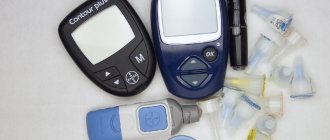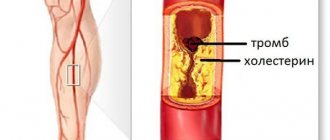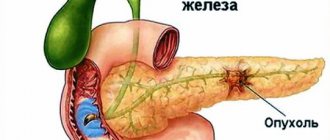Pregnancy is a very important event in the life of any woman. For some it is joyful and long-awaited, for others it is the opposite. But, one way or another, everyone wants to know about the beginning of the development of a new life as early as possible - if possible, already in the first days after conception.
The reason to suspect pregnancy for most women of reproductive age with a regular cycle is a delay in menstruation. Doubts are finally dispelled by two strips of self-test and the conclusion of a local gynecologist.
In this article we will talk about the very first signs of pregnancy before a delay; a woman can feel them already 1 week after conceiving a child.
What happens in the body?
First you need to understand how fertilization occurs, and only then talk about what signs of pregnancy may be in the early stages of its development. When a woman's egg matures, it leaves the ovary and travels down the fallopian tube. If the conditions are normal, then she is fertilized by the most active sperm.
Due to the fact that the speed of sperm movement is small, no more than 2 mm per hour, the fertilization process can take a long time. When this happens, the division of the zygote begins. In addition to starting to divide, she needs to find a place in the uterus where she can attach in order to receive the necessary nutrients.
After fertilization, the egg moves to the uterus and this can take one to two weeks. Only after the embryo attaches to the wall of the uterus can we say that pregnancy has occurred.
Changes in the body in the early stages of pregnancy
The first stages of pregnancy are the most important. It is at this time that the foundations of the baby’s vital organs are laid. Conception occurs during ovulation. You can determine the onset of ovulation by measuring your basal temperature. At this time, this temperature may be slightly increased. Pharmacies also sell express tests for ovulation, which allow you to track its onset . Which test to choose depends on your financial capabilities: the more expensive the test, the higher its accuracy.
Usually, the first symptoms of pregnancy in the first week go unnoticed, since the female body is just beginning to change. The following changes occur :
The level of progesterone, the so-called pregnancy hormone, increases in the body. Lack of progesterone can lead to spontaneous termination of pregnancy, therefore, if a deficiency of this hormone is suspected, doctors prescribe a course of treatment to the woman in a hospital, including progesterone injections;
- The level of male hormones, such as testosterone, decreases;
- The woman’s body begins to experience an increased need for vitamins, minerals and other useful substances, since at this stage the formation of the vital organs of the fetus occurs;
- The uterus begins to gradually increase in size. However, at the first stage this increase is almost imperceptible. You should also keep in mind that the uterus can be enlarged for other reasons (for example, a recent cesarean section or cancer), so to clarify the diagnosis, the attending physician will definitely refer the woman for an ultrasound examination. Only an ultrasound can definitively confirm or refute the fact of conception.
Pregnancy test in the first week
The principle of operation of rapid tests , which are sold in pharmacies, is quite simple. The main signs of the first week of pregnancy are the test readings. The simplest pregnancy test is a strip on which a chemical reagent is applied. It is initially colorless, but has the amazing ability to change color upon contact with human chorionic gonadotropin (hCG). Accordingly, if the concentration of hCG in a woman’s body is increased (and this is the norm in the early stages of pregnancy), the strip with the applied reagent turns red or pink. In order for a pregnancy test to show the correct result, you must:
- Use the test only in the morning, because the concentration of hCG in the body of a pregnant woman increases sharply in the morning and decreases in the evening;
- Keep the test in the urine exactly as long as prescribed in the instructions;
- If the result is not clear at first, you can carefully place the test on a flat horizontal surface and evaluate the result ten minutes later. After ten minutes, the results will no longer be reliable;
- Buy quality tests, avoiding the cheapest options. The best way to determine pregnancy in the early stages is the jet test. It is convenient because you do not need to collect urine in a container to use it. You just need to place the test under a stream of urine while visiting the toilet, and a reliable result will appear in a few seconds.
How to notice early pregnancy
In some cases, slight bleeding may be observed at the initial stage. They last less than menstruation (one or two days), and are associated with the process of implantation of the embryo into the wall of the uterus. That is why there is an opinion among women that you can “get pregnant during your period.” However, this phenomenon occurs only in some women. Around the third week, an ultrasound shows the fertilized egg and yolk sac (with the help of this sac, the fetus receives nutrition until the placenta has formed ).
Sometimes it happens that the embryo “freezes” (stops developing). In this case, at a later stage (eighth to tenth week), only the fertilized egg is detected on ultrasound, but there is no fetus, and its heartbeat cannot be heard. In this case, doctors diagnose a “frozen” or “non-developing” pregnancy. As a rule, this ends in abortion for medical reasons or spontaneous miscarriage.
If the fetus develops normally, usually after the third or fourth week the embryo is clearly visualized on ultrasound and its heartbeat can be heard. It is the presence of a fertilized egg and embryo that is an important first sign of the onset of pregnancy.
The following signs will also help determine pregnancy:
- Early signs of toxicosis (nausea and vomiting, weakness, dizziness);
- Changes in habitual eating habits, the emergence of unusual preferences in food and drinks;
- A sharp increase or decrease in blood pressure;
- Increased fatigue and tearfulness, sudden changes in mood;
- The emergence of obsessive fears associated with pregnancy;
- A sharp weakening or, conversely, an increase in sexual desire. Its increase in pregnant women is as common as its decrease. It should be borne in mind that if there is any threat of spontaneous abortion, any sex is strictly contraindicated until the threat of miscarriage is completely eliminated.
When can you expect the first manifestations?
Early symptoms of pregnancy can be observed as early as 8-10 days after the fertilization of the egg. This period may vary, depending on the body's sensitivity to hormonal changes.
In medical practice, there have been cases where women recognized fertilization already on the 5th day. In this context, we are talking about women who listen carefully to their body and feel the slightest fluctuations in their condition. On the 20th day of the cycle, signs of pregnancy take on a characteristic appearance.
You can confirm your position only after the formation of reliable symptoms. It is not possible to detect signs of pregnancy on the first day after conception.
Food aversions during pregnancy.
Your hypersensitive nose may be responsible for another early pregnancy sign: food aversions during pregnancy, where the thought, sight or smell of certain foods you love can turn your stomach. This early pregnancy sign can be caused by anything from chicken to something seemingly more benign like lettuce.
Although food aversion is not one of the very first signs of pregnancy, it tends to pop up in the first trimester of pregnancy. You may again blame your hormones, especially in the early stages when your body is overwhelmed with them and is still getting used to all the hormonal changes. Don't worry: this goes away in the second trimester of pregnancy, when everything calms down.
Signs of pregnancy: TOP 10
You can recognize the first symptoms indicating pregnancy by the following signs:
- Increase in basal temperature;
- Lack of menstruation;
- Enlargement and tenderness of the mammary glands;
- Changes in taste preferences;
- Frequent urination;
- Fatigue and drowsiness;
- Increase in basal temperature;
- Nausea;
- Vaginal discharge;
- Frequent urination.
The pregnancy process is full of interesting and pleasant moments. And the birth of your baby will open up a whole new world and become a new page in your life.
Pregnancy first days signs
For most women, their breasts begin to swell and become heavier, and then the nipples and areolas begin to change their color to a darker color.
It is impossible to touch the breast due to discomfort and pain. In addition to all this, a pregnant woman begins to run to the toilet very often, including at night. This will not happen throughout your pregnancy, but during the first trimester these signs are common. It is worth saying that you will not necessarily observe any of these signs in you, but it is quite likely that they may be different for you, it all depends on the individual.
The problem is that few women can accurately name these very days, and sexual intercourse during this period will not necessarily guarantee pregnancy. That is why almost every woman who is sexually active often listens to her body, trying to understand: has pregnancy occurred? This is done both by those for whom pregnancy is a long-awaited holiday, and by those for whom it is an unpleasant surprise. To accurately determine whether the amazing process of development of a little man has begun in your body, it is worth knowing the main signs of pregnancy. Every woman should know exactly the duration of her menstrual cycle. Many people mark critical days on calendars, many simply remember them. If you have a regular cycle and your period is a few days late, then you have reason to suspect pregnancy. However, a delay may indicate a disease, such as hormonal imbalance. Moreover, you should not rely only on this fact if your cycle is irregular. You will have to look for other signs of pregnancy.
Many pregnant women complain of nagging pain in the lower abdomen, increased breast sensitivity and slight discharge. This may be a sign of pregnancy, or it may simply indicate an imminent period. For many women, pregnancy begins with toxicosis: nausea and vomiting in the morning, intolerance to certain smells, changes in taste preferences in food. Toxicosis is very similar to banal poisoning, so there is no need to exclude this option. Perhaps you ate stale food and your body is simply reacting appropriately. Many pregnant women do not have any toxicosis, which means this sign is not obligatory.
During your examination, your gynecologist may reveal several more signs: an enlarged uterus, a change in the color of the external genitalia. But do not forget that these signs of pregnancy may be false and indicate only an approaching menstruation.
You can get more accurate signs of pregnancy with an ultrasound examination: the doctor will certainly see the fetus if pregnancy has occurred. However, occasionally there are cases when the nascent life cannot be seen because the gestation period is too short.
Lack of menstruation
The most obvious and well-known symptom is that you notice that your period is not on time. But, despite the fact that this symptom is most often attributed to pregnancy, there are a number of other reasons that can lead to a delay. For example, severe stress, serious illness or surgery.
On the other hand, many women note the presence of menstruation already during pregnancy. For some, they will continue for several months or even the entire pregnancy.
Sign No. 2: swelling of the mammary glands
The first signs of pregnancy can sometimes coincide with the onset of your period. Many women note breast tenderness as the beginning of “critical days.” But the swelling of the mammary glands during pregnancy and when it is not, has its own differences. For example, a pregnant woman’s breasts not only become inflamed, but become lumpy.
Other signs during pregnancy:
- breast halos darken, nipples become harder;
- visible blue lines on the chest (veins);
- bumps on the breast aureole increase in size and number.
There may be a burning sensation and severe pain in the chest. Some complain that they can't even touch, let alone put on a bra. After a month, the symptoms will become less noticeable. You will be able to sleep peacefully on your chest and wear tight-fitting underwear.
Increase in basal temperature
Don't be lazy: watch your basal temperature throughout your cycle. If you are pregnant, your temperature will either rise to 37 degrees or drop sharply for one day in the second phase of the menstrual cycle. This process is called “implantation retraction.”
There may be two reasons. Firstly, from the middle of the second phase, the production of the hormone progesterone, which is responsible for raising the temperature, decreases, but if you are pregnant, it begins to be produced again. Therefore, temperature fluctuations occur. Secondly, during pregnancy there is a release of the hormone estrogen, which lowers the temperature.
Frequent urge to urinate
A very common and reliable symptom, the first week of pregnancy is constantly accompanied by frequent urination and other similar troubles. This may be a consequence of cystitis - a very terrible and unpleasant infectious disease. Symptoms of cystitis include increased frequency of trips to the toilet, pain during urination, fever and severe fatigue. Every woman can get cystitis after conception, and this is not due to infection, but to an increase in progesterone production.
This hormone improves the health of the fetus and creates relaxation in the bladder. Due to such strong relaxation, the channel remains open, and the desire to go to the toilet appears even with an empty bladder. If you do not have intense pain, relax and experience this symptom, but if you still have pain, you need to see a doctor and undergo treatment. Cystitis is not something to joke about; it is better to cure its initial stage than to fight the chronic one.
Coping with unpleasant symptoms in the first trimester
As a rule, the first three to four weeks of pregnancy are practically asymptomatic and are determined on the first day of the delay by a test. A little later, unpleasant symptoms begin to appear: nausea, weakness, dizziness, and pain in the lower abdomen may occur.
Sometimes chronic cystitis worsens , which is associated with the onset of hormonal changes in the female body. Some women begin to experience bloating. Outwardly, it is still impossible to determine that a woman is carrying a child: she has no swelling, no large belly, no age spots. In general, signs and sensations in the first week of pregnancy can be very different and be of both physiological and psychosomatic nature. Vegetative-vascular dystonia, depression may be a concern, some women are susceptible to mood swings.
In order to successfully deal with unpleasant sensations in the first trimester of pregnancy, a woman should lead a healthy lifestyle, get plenty of rest, eat right and, if possible, avoid conflicts and stressful situations. You can take any medications against toxicosis only with the permission of your doctor; self-medication with medications is strictly prohibited. If a woman suffers from severe toxicosis, treatment is carried out in a hospital setting. Droppers with saline are prescribed to saturate the body with nutrients, as well as restorative medications.
Regular intake of multivitamins and vitamin complexes effectively helps combat discomfort. If the onset of pregnancy occurs in the winter, you should take immunomodulators that are not contraindicated for pregnant women. These medications will help strengthen your immune system and prevent you from becoming a victim of acute respiratory diseases. It is also worth leading an active lifestyle and, if possible, continuing to play your usual sports. You should consult with a personal trainer and your doctor about exercise loads during pregnancy.
The beginning of pregnancy is the most important period of bearing a child. For some, this period is easy, but some women experience all the “delights” of toxicosis. This depends on the individual characteristics of the body, as well as on the moral attitude. Experts say that positive pregnant women suffer from toxicosis and other unpleasant symptoms much less than pessimists. The first signs of pregnancy in the first week will help a woman quickly diagnose it and quickly consult a gynecologist; only he can determine whether conception has occurred.
Reliable signs of pregnancy
These undoubted manifestations 100% indicate pregnancy. Their detection is possible from the second week of gestation and later, so they are considered late.
- Ultrasound confirmation of the presence of the fetus.
- Recording the fetal heartbeat using instrumental methods - CTG, PCG, ECG, and also from 15 weeks using a stethoscope.
- Detection of the head, arms and other parts of the fetus, possibly moving it during palpation.
To make a reliable diagnosis, it is important to take into account the opinion of a specialist. During a medical consultation, you can find out on what day the first signs of pregnancy appear and how to distinguish them.
What not to do?
It is highly not recommended to do an ultrasound in the early stages. When the fertilized egg is still small, even a modern device has no way of not seeing it. Transvaginal examination is used only in extreme cases. At home, you can confirm or deny pregnancy using a test. This is a safe and non-harmful method.
The ideal time for an ultrasound examination is 12 weeks. This is considered the end of the first trimester and the beginning of the second. It is at this point that the signs of pregnancy are reliable and the embryo can be examined. Modern technologies make it possible to take a color photo using ultrasound as a souvenir for parents.
Rapid pregnancy test results
The rapid test, which can be purchased at any pharmacy, gives objective results five or more days after the first day of expected menstruation. However, such tests often give erroneous readings (usually erroneous negative readings).
This happens due to the fact that the test reacts to the amount of the hormone human chorionic gonadotropin in a woman’s urine. Levels of this hormone increase slowly in the first months as pregnancy progresses. In the case when you need to find out about the onset (or non-occurrence of pregnancy) before five days of delay, you can do a test in the laboratory; it has more objective results.
An increase in the amount of human chorionic gonadotropin in the urine also occurs with certain neoplasms of the uterus.
Sign No. 3: no menstruation
Lack of menstruation is a symptom that ranks first on the list of “initial signs of pregnancy.” Despite this, there are many reasons that explain this phenomenon. For example:
- infections;
- inflammatory processes;
- hormonal changes.
Severe stress can also affect the length of the menstrual cycle. If other signs of pregnancy complement the symptom, fertilization may have occurred. This can be confirmed with 100% probability only after a doctor’s examination and a blood test for hCG.
Still, the absence of menstruation is a reason to go get a test. If it is negative, there is no suspicion of the onset of menstruation, it is worth repeating it in a week. It happens that you come across a defective test, expired or with low sensitivity. In this case, there may be a false positive response.
Doctors always recommend buying several tests from different companies and doing them early in the morning, when the concentration of hCG in the urine is highest. If a woman is planning a child, she can purchase an electronic reusable test. This is convenient and saves a lot of money.
What are the signs of a pathological pregnancy?
A dangerous symptom of pregnancy is severe pain in the abdomen, uterus and fallopian tubes. With or without fever. The appearance of such even not very painful sensations, and the absence of menstruation, is a sign of a life-threatening ectopic pregnancy.
In such cases, the woman is urgently examined and, if indicated, operated on, since delay can lead to serious problems with women’s health and even death. This happens extremely rarely, so do not be alarmed in advance, but simply see your gynecologist in a timely manner.
Sign No. 9: toxicosis
The first symptoms of pregnancy in the form of nausea are common. 1 in 3 women feels all the delights of toxicosis in the early stages, without even realizing that it is not just poisoning. The body perceives the fertilized egg as a foreign body and does not always accept it.
A balanced diet will help you get rid of toxicosis and morning sickness. Symptoms increase with low blood sugar. Here you need to consult a gynecologist and nutritionist. You should not change your diet on your own. The situation can only worsen and new signs will appear during pregnancy, in the form of fever or acute malaise.












